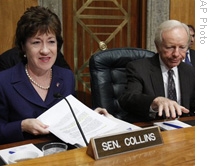Capitol Hill
22 September 2009
 |
| Senators Joseph Lieberman (r) and Susan Collins prior to start of committee's hearing on Weapons of Mass Destruction Prevention and Preparedness Act of 2009, on Capitol Hill, 22 Sep 2009 |
Senator Joseph Lieberman is an Independent Democrat from Connecticut, and is chairman of the Homeland Security and Governmental Affairs Committee. He commented on the sober conclusions of a congressionally-mandated commission created to study changes to national security policy in the wake of the September 11, 2001 terrorist attacks on the United States.
"A WMD attack is probable somewhere in the world in the next four years, and it is more likely to be biological than nuclear," he said.
Senator Lieberman and Republican Senator Susan Collins of Maine have introduced legislation that would enact the commission's recommendations and establish what he called a "comprehensive framework" to protect the country from attacks using weapons of mass destruction.
Lieberman warned that the United State's margin of safety is shrinking and not growing, and said the bill, the Weapons of Mass Destruction Prevention and Preparedness Act of 2009, is the best way to ensure that the lives lost in the 2001 attack were not in vain.
Republican Senator Susan Collins of Maine pointed out that the threat of a biological attack definitely begins at home.
"Some of the world's most dangerous pathogens are not secure," she said. "And that includes pathogens housed in bio-labs right here in the United States."
The new legislation would require labs working with deadly pathogens to increase security. Gregory Kutz of the Government Accountability Office says this is essential because of gaping holes in perimeter security in two of the nation's five labs that work with the most dangerous pathogens.
"First we found significant differences in perimeter security at the nation's five level-four labs," he said. "These labs handle the world's most dangerous agents and toxins that cause incurable and deadly disease."
The legislation also provides that police and firefighters would receive medical kits so that they could quickly respond to terrorist attacks, while protecting themselves and their families.
Tuesday's hearings on Capitol Hill came as Homeland Security and FBI officials issued security bulletins to police across the U.S. about terrorists' desire to attack stadiums, entertainment complexes and hotels. Counterterrorism officials say there is no information on timing or locations. Law enforcement officials also say a man arrested in Colorado Saturday may have been planning with others to detonate backpack bombs on New York City trains in a terrorism plot similar to past attacks in London and Madrid.